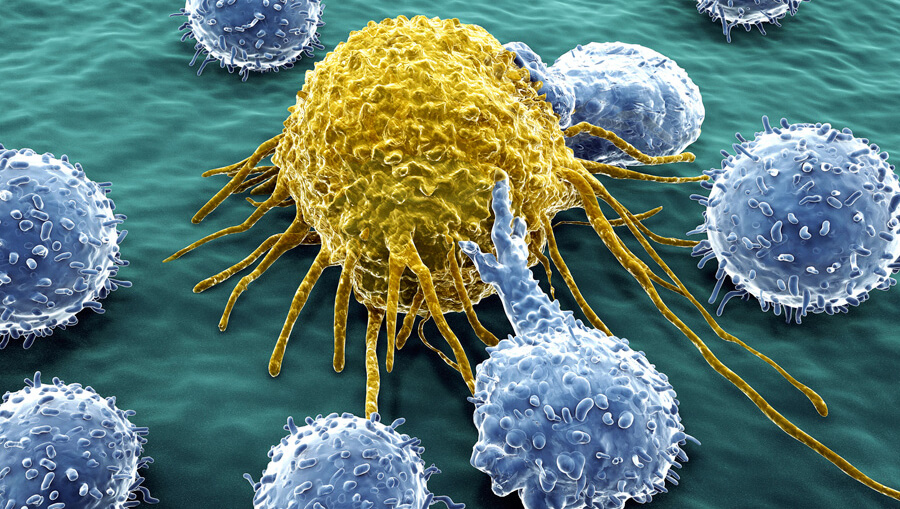
Dr Evengelos Michelakis, associate chair and medical researcher at the University of Alberta’s faculty of medicine and his team of researchers have discovered a cure for cancer. Long after his work was published in the Journal of Clinical Investigation (JCI) (3)(4), Circulation (2002, 2006), Circulation Research (2004)(5), PNSAS (2007)(6)(7), and Science Translational Medicine (August 2010) (1)(2), the University of Alberta’s research team still isn’t receiving any support from the medical industry.
Dr Michelakis and his team of researchers were the first to show that a cancer marker called survivin, which was thought to be found only in cancer cells was also heavily expressed in abnormal pulmonary arteries. The work was one of the first comprehensive studies to show a link between pulmonary arterial hypertension (PAH) and cancer, as you can see from the sources listed above.
A portion of his work was also recently published by the National Center for Biotechnology Information (NCBI). Dichloroacetate (DCA) was found to shrink solid tumors, including the aggressive primary brain cancer glioblastoma multiforme in human beings. You can view that study here(8).
Dr Michelakis’s research supports the emerging idea of altering the metabolism of tumors as a new direction of treatment for cancer. The drug is called dichloroacetate (DCA), and its been proven to reverse cancer growth. The drug tricks cancer cells into normal energy production by changing the ways they handle nutrient fuels. This causes the cancer cells to commit suicide without harming any healthy cells. Many researchers around the world have confirmed the research coming out of the University of Alberta.
Dichloroacetate (DCA) is a small molecule drug that has long been used to treat congenital mitochondrial abnormalities. The mitochondria (cell power source), is vital for several reasons. One of them is acting as oxygen sensors and control, as well as controlling programmed cell death. This process if known as apoptosis. The significance here is that this process is suppressed in cancer, a disease that’s characterized by uncontrolled cell growth.
Major studies within cancer research have been proven to be false which also suggests that the mainstream treatments we use are based on fraudulent findings and false science. It’s usually the treatments not heavily publicized and promoted that we should keep our eye on. More researchers are catching on, not to long ago University of Michigan researchers suggested increasing public funding of research to decrease potential bias from industry ties. You can read more about that here.
What’s encouraging here is that the studies coming out of the University of Alberta are indeed publicly funded! Therefore there is absolutely no bias from industry connections, so it is much easier to trust and has the potential for higher validity.
Findings published in the journal Nature show that 88% of major studies on cancer that have been published in reputable journals over the years can not be reproduced to show their accuracy. This means that the research findings published makes it more difficult to trust them and threatens their validity.
Why Is The Drug Not Being Used?
The University of Alberta team has conducted tests on humans, but the pharmaceutical sector of medicine is responsible for funding clinical trials that lead to the approval of medical treatments. It turns out that the rights to the DCA compound are not owned by any pharmaceutical company. This is a problem, as most of U of A’s research on this issue has been publicly funded. They are currently working to secure more funding to continue their research and ongoing DCA clinical trials.
Without industry support, it’s almost impossible to do anything with this research and infiltrate the health industry. It’s no different from any other industry. It’s not like you can take a water fuel cell car like Stan Meyer did, and introduce it to the energy industry. Doing so would wipe out the multi trillion dollar industry, it’s no different from the medical industry, heavy suppression of known cancer treatments is likely to exist.
Drug companies are not interested in drugs that won’t make them a profit. At the same time, we must keep in mind that all of the big pharmaceutical companies share the same owners as all of the big biotech giants like Monsanto and other food corporations. Our food is littered with toxic chemicals and GMO’s, and there is a large amount of evidence to suggest that these contribute in the sickness we see the human race plagued with today, making them dependent on pharmaceutical drugs. Please use our search bar, or browse through our health, science/tech and alternative news sections for more information on this subject.
Cancer treatments shouldn’t be limited to drugs, there are plenty of natural remedies that have proven to be effective. You might want to look into cannabis,hemp oil, soursop, baking soda and more. It’s time to start questioning the industry and, with all of the evidence available ask yourself, is cancer really untreatable? It is after all multi-trillion dollar industry.
At the end of the day, it comes down to making better choices in your life.
https://youtu.be/aWRzikJ3iso
This is an old broadcast, and the drug has since been proven effective on humans, as well as human cancer cells outside of the body.
Sources:
(1) http://stm.sciencemag.org/search?site_area=scitransmed&y=0&fulltext=evengelos%20michelakis&x=0&submit=yes
(2)http://stm.sciencemag.org/content/2/31/31ra34.abstract?sid=100a70f2-903f-4bea-8625-23e3d9350a29
(3) http://www.jci.org/articles/view/23203
(4) http://www.jci.org/articles/view/23203/pdf
(5) http://circ.ahajournals.org/content/105/2/244.abstract?sid=9459011e-e64a-47b3-9814-a517e313e3a5
(6) http://www.pnas.org/content/104/27/11418.abstract?sid=71a97c19-efca-4dd5-ade7-66af850c4995
(7) http://www.pnas.org/content/100/16/9488.abstract?sid=e9095e6a-d418-4a53-8a15-a6ece49b4dad
(8) http://www.ncbi.nlm.nih.gov/pubmed/20463368
http://www.bccancer.bc.ca/NR/rdonlyres/C88B0C23-F6F9-454B-BF33-0A6AEBADC250/57155/Headlines_2011_Winter.pdf
http://news.ualberta.ca/newsarticles/2010/05/genericdrugmaybepotentialtreatmentfordeadlybraincanceruofamedicalstudy
http://www.uofmhealth.org/news/1147cancer-studies-report-conflict-of-interest
source:
related: